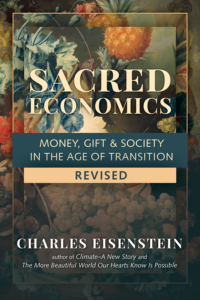Climate — A New Story
Chapters
Chapter10: Money and Debt
A Game of Musical Chairs
When we speak of a transition away from a high-growth, high-waste society, when we speak of nonquantitative notions of development, we immediately encounter the topic of economics. And when we speak practically of the “conditions of our choice” to continue ruining the biosphere, it is often that very quintessence of practicality—money—that determines our choice. Money is seldom the friend of earth healing. Usually, in our current system, there is more money to be made destroying an ecosystem than preserving it. Deforestation, drilling, overfishing, wetlands draining for real estate development … the power of money drives them all. But why? Is money just bad? Are human beings just greedy? Must we forever fight a war against the money power?
The following metaphor suggests that the answer to these questions is no.
Most readers will be familiar with the game Musical Chairs. Imagine a large game of Musical Chairs is in progress, with a thousand people and 950 chairs. Everyone is dancing around the circle, and when the music stops they all rush for a chair. Those who don’t find one in time are out of the game, and the next round proceeds with 950 people and perhaps 903 chairs.
Now let’s make the game a little more interesting. When you lose a round, you aren’t merely out of the game. You also lose your home and must choose between food and medicine for your children. The very survival of you and your loved ones is at stake. The game begins. Everyone is in a state of anxiety, maneuvering for the most advantageous position. When the music stops a mad rush ensues for the chairs, an elbowing, shoving free-for-all in which the chairs go to the strong, fast, and lucky.
Sitting outside observing the scene is an economist, a biologist, a politician, and a priest. “Will you look at that,” says the economist. “That’s human nature for you. Everyone out to maximize their own interest at the expense of everyone else.”
“Yes,” agrees the biologist. “We are watching the survival of the fittest in action. Only the strong, quick, and ruthless will survive. It’s just human nature.”
“Lucky thing we’ve got us around,” says the politician, “to impose law and order to curb human nature and enforce decent behavior.”
“I’m going in there to teach them to be nicer to each other,” says the priest.
Is this free-for-all really human nature, though, or is it an artifact of the rules of the game? Imagine if there were one thousand people and one thousand chairs of different shapes and sizes, and the game were a matter of matching the right person to the right chair. What would “human nature” look like then? Who likes a soft seat? Who likes firm? Who has long legs? Who has a large buttocks? The play of the game would look very different; it would involve a lot of communication and cooperation. Different structures would emerge to match the right person with each chair. There might still be some competition, but it wouldn’t be baked into the rules of the game.
Structures might emerge in the original game too. Sometimes a strong person might secure a chair for himself and a friend or two. Small groups might form to secure chairs at the expense of other groups. Certain altruistic individuals might sacrifice their own chance at a chair so that the young mother with the baby can get one. Others (after having secured a chair themselves) might exhort others to be a little nicer to each other and not push so much. The rules of the game, though, entail that generosity equals self-sacrifice. More for you is less for me. It is a zero-sum game; in fact it is a negative-sum game.
Musical Chairs is closely congruent to our current economic system (with one important difference I will discuss shortly). Because money in our system is lent into existence, and because those loans carry interest, at any given moment there is always more debt than there is money. Just as in Musical Chairs, everyone is therefore set into competition with each other for never enough money. The “strong, quick, and lucky” get a “chair”—the money they need to enjoy material security—and the weak, the unfortunate, and the disadvantaged do not.
Imagine further that the circle of 950 chairs is not evenly arranged. Some areas have a sparser distribution of chairs than others, and it is into those sections that the black, red, and brown people are put. They long for a place at the denser part of the circle, and perceive racism to be the source of their poverty. What they do not realize, though, is that if not them, someone has to be deprived of a chair, because that result is designed into the rules of the game. To the impoverished black, red, and brown people it sure looks like racism is the cause of their poverty, but in fact it is more of a symptom and enabler of a system that must impoverish someone: if not us, them. So different factions seek to engineer the circle so that their section has proportionately more chairs (in the real world, this corresponds to the imperial control of resources), engendering a new level of competition and setting conditions conducive to racism, nationalism, and imperialism.
Everyone is so focused on winning a higher proportion of chairs for themselves and their group that they don’t question the rules of the game and whether those might be changed.
Here’s a little snapshot of how it plays out. According to Matthew Desmond’s piercing book Evicted, tens of millions of people in America today spend 50 percent or even 70 percent or 80 percent of their income on rent, living always just one health crisis or car repair away from a downward spiral that starts with eviction and ends in total destitution: family breakup, prison, homelessness, or worse. One would like to blame heartless landlords, but in fact the heartlessness originates systemically. It is a system predicated from top to bottom on the maximization of self-interest, and therefore demanding we treat others as instruments of our own utility. The “heartless landlord” is subject to the same basic economic insecurity as everyone else, albeit more distant. An economic downturn, a stock market crash, and she too might descend into penury. Quite often, the building owner is a real estate holding company that contracts out building management and is under pressure to maintain a decent rate of return in order to service debts to its own creditors. At the base of the system are the large institutional investors, depriving any firm of capital unless it produces the highest possible return. Maybe we should blame their greed—except that the largest are mostly pension funds, desperate for high enough returns to fund the retirement of teachers, firefighters, and other workers.
Heartlessness inevitably accompanies this system of dehumanization and exploitation. If you care too much, quite often you’ll go out of business. No chair for you.
Leftists love to blame corporations and their executives for the planet’s predicament, but they are creatures of the system, carrying out structurally determined roles. Certainly there is some leeway for corporations to act more or less in the public interest, but to deviate too far from aggressive service to the bottom line faces the company with the iron law of the marketplace. Its more ruthless competitors will destroy it, or perhaps squeeze it into a small niche. That is why it is foolish to hope that ethics training or meditation in the boardroom will fundamentally change aggregate corporate behavior.
The movement to reform corporate charters (to mandate limited terms and profits, and require they serve the public benefit) is a step in the right direction, but we also must understand that the corporation as we know it is not some unfortunate accident of history, but a natural adaptation to the “rules of the game” as well as the inevitable end product of an all-encompassing story. It is like the fulfillment of a prophecy. The doctrine of rational self-interest, which is not true, has never been true, and never will be true for human beings, was the prophecy. The corporation is the vehicle of its fulfillment. It is the culminating expression of the ideology of self-interest.
The behavior of corporations is a distilled and expanded version of how people generally behave in an economic system of artificial scarcity that distances causes from effects. The corporation is a more ruthless player of Musical Chairs than most actual humans can be, and therefore excels at the game. Nonetheless, you and I replicate the same basic ruthlessness whenever we seek the best deal. Suppose you want to fill your gas tank. One gas station charges ten cents per gallon more than the other, for exactly the same quality and service. Everything you can measure is identical. Which do you choose? Do you think, “Well, if I choose the cheaper one, it won’t make a fair profit or be able to compensate its employees fairly. I’ll choose the more expensive one.” Probably not. Writ large, this is essentially the behavior of corporations. They are the highly developed historical implement of the subordination of life and matter to the pursuit of self-interested value. Like so much of what we blame for our woes, they are more a symptom than a cause of the present crisis.
None of this is meant to dissuade companies and individuals from doing their best to adopt sustainable practices. Such choices contribute to a shift in the story of “normal.” Even when they appear to fail, they bring into sharper relief the conflict between our system and our ideals. Although better ethics or more spirituality won’t change the rules of the game or reverse the tide against which sustainability must swim, I actually see value in the oft-derided “corporate mindfulness” movement, “conscious capitalism,” and meditation in the boardroom. Critics say they merely facilitate business-as-usual under a cloak of spirituality, which would be true indeed if these practices had no real power. Applied sincerely, they have the opposite effect: they make business-as-usual harder. They arouse troublesome questions with no easy answers. They precipitate a crisis for the organization and the people in it. And that is good.






